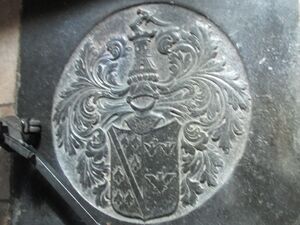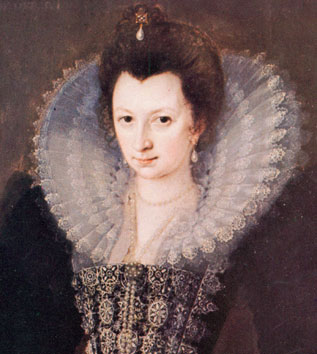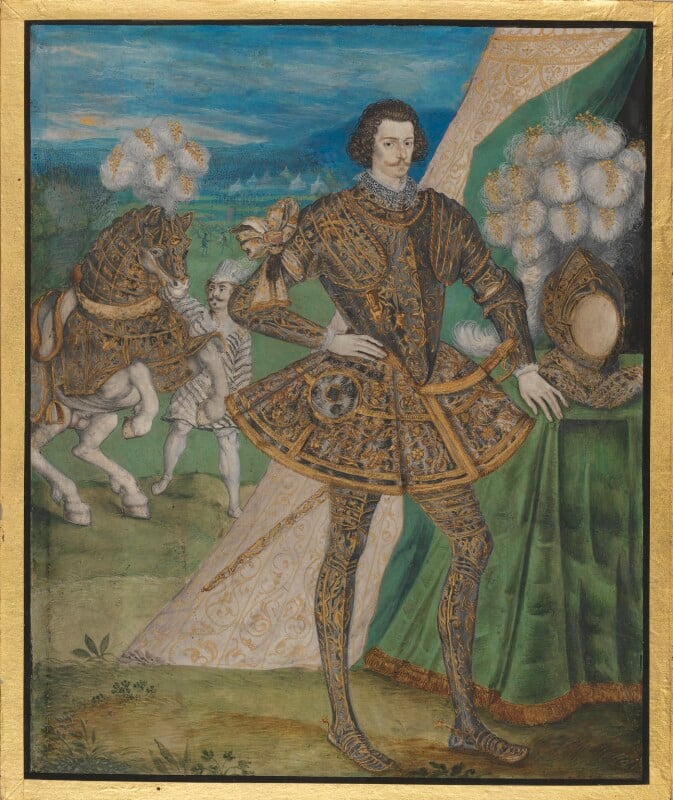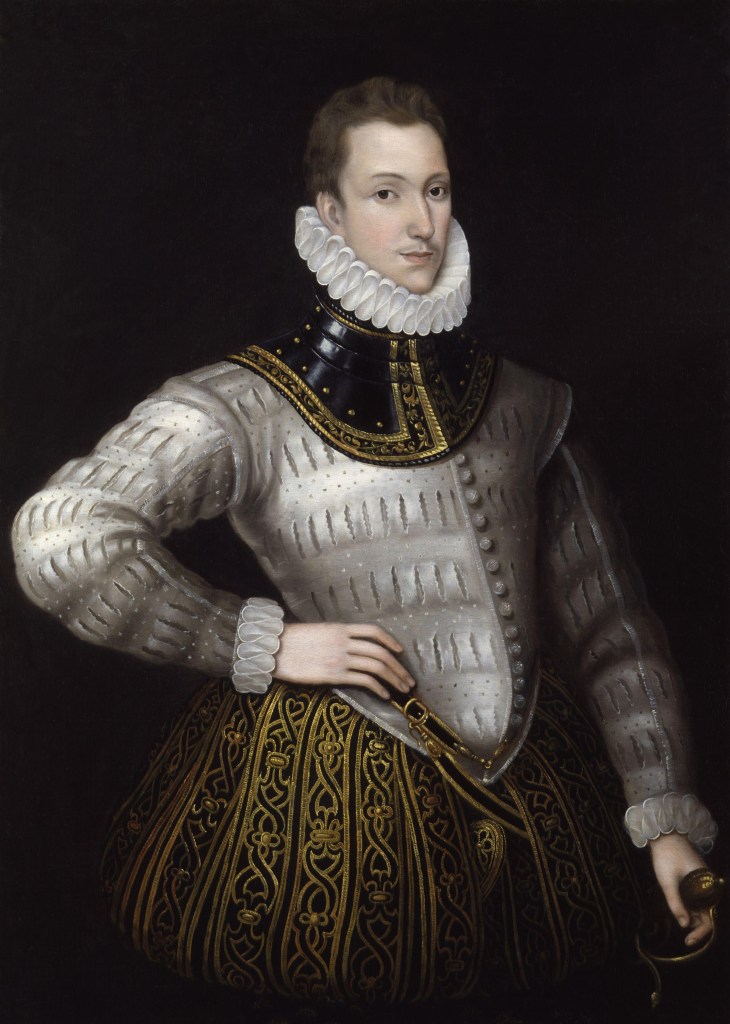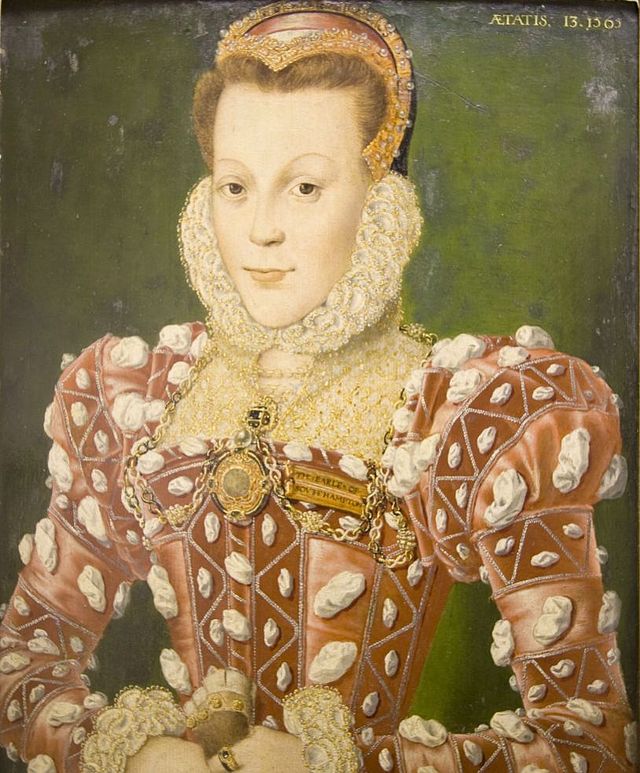(It’s best to read ‘When Will met Harry – a Riposte to the B.B.C’ – first.)
John Aubrey………
….. got his information about Will being country schoolmaster from the actor William Beeston – whom John Dryden described as ‘the chronicle of the age’. William in turn got the information from his father Christopher Beeston – who had been apprenticed to the actor Augustine Phillips, and who later acted with Will in the Lord Chamberlain’s Men.
We know that there is a schoolhouse at the gates of Titchfield Abbey…..
The question is: did Will teach there?
There was an earlier William Beeston – who became part of the Southampton entourage – who died in Posbrook Farm in 1638.
The question is – was he related to Christopher Beeston? The almost universal cry has been ‘No’ – but let’s briefly examine the timeline for October 1638:
On 4th October Christopher Beeston – writing he is ‘sick and weak in body’, has ‘many great debts’ and is ‘engaged for great sums of money’ – completes his will – but signs it:
‘Christopher Hutchinson’.
7th October: Christopher Beeston/Hutchinson writes a codicil to his will.
Two days later – on 9th October – William Beeston of Posbrook Farm – stating he is ‘weak in body’ and bequeathing ‘to every child that God hath sent me five shillings a piece for their portions’ signs his will.
Seven days later – on 17th October – Christopher Beeston/Hutchinson is buried in St. Giles-in-the-Fields in London.
Seven weeks later, on 3rd December, William Beeston of Posbrook Farm is buried at St. Peter’s, Titchfield.
Either this is a coincidence of cosmic proportions or there is a link of some sort between the two men….
Let The Shakespeare Code propose one!
Christopher Beeston had an alternative name ‘Hutchinson’ – which suggests he might have been illegitimate. William Beeston of Posbrook Farm writes about the children ‘that God hath sent him’ which sounds to us like a euphemism for children born out of wedlock.
William Beeston of Posbrook fathers Christopher out of wedlock. Christopher studies at the Titchfield Grammar School and is briefly taught by Will, who encourages him to become the boy actor known as Kitt.
William Beeston of Posbrook becomes respectable because of his association with the Southampton family. He even marries a much younger wife in the 1630s, fathers legitimate children and 1637 even acquires a Coat of Arms.
Christopher, on the other hand, after acting with Will in The Chamberlain’s Men, gets wilder and wilder – he runs a brothel, gets accused of rape and sometimes uses an alias – ‘Christopher Hutchinson’.
William Beeston of Posbrook disowns him. But Christopher gets very ill and begs his natural father to visit him – and he does so out of humanity.
Christopher, completely impoverished, asks his father to help his son, named William after him, financially – but William Beeston of Posbrook – who by now has his own little William – refuses. Christopher cuts himself off completely from his father by using his Christopher Hutchinson name when he signs his will, and even refers to his son as ‘William Hutchinson’. William Beeston of Posbrook gives five shillings to all his children – legitimate and otherwise – as a blocking bequest to stop them from claiming any more. He leaves everything to his wife.
Unfortunately Posbrook Beeston catches the plague from his son and dies soon afterwards.
We cannot (at the moment at least) prove this theory – but The Code believes that forming a credible story from the known facts is a legitimate way of investigating the truth.
What we know for certain is that Harry Southampton graduated from St. John’s College, Cambridge, in 1589 and was in residence in Titchfield in 1590. He was to turn 17 that year and massive pressure was being put on him by his guardian, Lord Burghley……
…….Queen Elizabeth’s Secretary of State – to marry his grand-daughter Elizabeth de Vere.
Harry was refusing – so his family faced an enormous £5,000 fine.
But Harry wasn’t interested in girls. His father, the Second Earl of Southampton…..
[Photo by Ross Underwood]
…..had accused his mother, Mary, of adultery with ‘a common person’ and had snatched his son away from her at the age of 6. In the words of Mary, the Second Earl ‘made his manservant his wife’ and surrounded himself with….
‘a whole troupe of at least a hundred well-mounted gentlemen and yeomen and tall goodly fellows that kept a constant pace.’
The Second Earl had died when Harry was eight – and Harry became part of Lord Burghley’s household where he met the young Earl of Essex…..
….who had also lost his father.
Greene’s famous attack on Will suggests he did much more for the Southampton household than simply tutor Harry. Greene described him as….
‘an upstart Crow, beautified with our feathers, that with his tiger’s heart wrapped in a Players hide, supposes he is as well able to bombast out a blank verse as the best of us: and being an absolute Iohannes factotum, is in his own conceit the only Shake-scene in a country.’
A word of warning. It is highly unlikely Greene wrote these words. Nashe claimed to have found the manuscript in Greene’s garret after he died – but many people – including Will – thought that Nashe himself had written the libel, passing it off as off as Greene’s dying curse.
Nashe swore his innocence, but ‘divers of worship’ – most likely the Southampton family – complained to the publisher of the pamphlet, Henry Chettle, who issued a grovelling retraction and described Will’s…
‘uprightness of dealing which argues his honesty, and his facetious grace in writing, which approves his art’.
To add to the complication, Nashe might well have been in Titchfield at the time – collaborating with Will when he wasn’t stabbing him in the back.
Intriguingly, Nashe dedicated his pamphlet ‘Strange Newes’ to a Mr. William Apis-Lapis.
‘Apis’ is Latin for ‘Bee’ and ‘Lapis’ Latin for ‘Stone’. Bee Stone. Mr William Bee-Stone – Mr. William Beeston. Posbrook Beeston even had bees on his coat of arms!
But back to the other Will…
As a ‘fac totum’ Will might well have taught the local schoolboys – and an American hand-writing expert – Charles Hamilton – discovered a letter signed by Harry that he believes to be in Will’s hand.
But Will was also the Southampton family poet. We know this for certain because of the Dedication of his two narrative poems to the Earl of Southampton – neither of which is mentioned by the B.B.C.’s ‘Rise of a Genius’.
The one to Venus and Adonis in 1593 is formal and tentative: this is because Harry’s mother had commissioned it. Harry had not yet come of age:
‘I know not how I shall offend in dedicating my unpolished lines to
your Lordship, nor how the world will censure me for choosing so
strong a prop to support so weak a burden’.
But the next dedication – to Lucrece – was written in 1594 when Harry was in full control of his finances . Will let’s his feelings fly:
‘THE love I dedicate to your lordship is without end; whereof this pamphlet, without beginning, is but a superfluous moiety. The warrant I have of your honourable disposition, not the worth of my untutored lines, makes it assured of acceptance. What I have done is yours; what I have to do is yours; being part in all I have, devoted yours. Were my worth greater, my duty would show greater; meantime, as it is, it is bound to your lordship, to whom I wish long life, still lengthened with all happiness’.
This outpouring of love for Harry brings us naturally to Will’s Sonnets…
There are 154 of them. Some of them are letters, some of them reflections, some of them flatter, some of them insult, some of them seduce, some of them reject, some of them glory in life, some of them despair of it. In short, Will reveals there is not a single emotion that characters go through in his plays that he has not gone through himself.
We might say we know more about him than any man who has ever lived were it not for one thing. Will – when he published the Sonnets in 1609 – did not print them in chronological order – rather in two piles – ‘to him’ and ‘to her’. The ‘to him’ pile is much, much bigger than the ‘to her’ pile.
Using a data base built up over the years, The Shakespeare Code has put all the poems into chronological order – and we believe a tremendous story emerges which involves a Lovely Boy, a Dark Lady and a Rival Poet.
Can we assume, for the moment, that Nathan Drake was right in 1817 and Dover Wilson in 1932 when they named Harry as the Lovely Boy?
And can we also assume, for the moment, that A. L. Rowse was right in 1973 when he named Amelia Lanyer, nee Basanno, as the Dark Lady?
Can we also assume that the Rival Poet was the Spirit Medium George Chapman….
…..who would summon up the ghost of Christopher Marlowe at the drop of a hat.
So here is the story – drawing on history and anecdote, along with Will’s plays and sonnets.
Mary Southampton commissions Will to write seventeen sonnets to celebrate Harry’s seventeenth birthday in 1590 – urging him to marry and have a son. She chooses the fourteen-line sonnet form because it has been perfected by the late Sir Philip Sidney……
….who lived at Wilton – a day’s horse-ride away – whom young Harry worships because of his bravery and chivalry.
Will argues that a son will give Harry another ‘self’ – his son – who will ‘wax’ like the moon while he himself ‘wanes’.
But Will – stepping way outside his brief – hints that he could also make Harry immortal by the power of his verse alone.
But these seventeen sonnets have the reverse effect of what Mary intended. Harry becomes attracted to his tutor – and though Will has been introduced to same-sex love by Marlowe in London, and admits to finding Harry, with his shoulder length hair, even more attractive than a woman, denies any physical interest in the boy. Will wants their love to be platonic.
In 1591 Queen Elizabeth arrives on her progress to Cowdray and Titchfield. In her entourage is the Basanno family – dark-skinned Sephardic Jews who are renowned for their music making. Among them is the beautiful young clavichord player, Amelia Basanno, who is the mistress of the Queen’s cousin – old Lord Hunsdon…….
Plague is raging in the city – so Amelia stays in Titchfield as an entertainer and companion to Mary Southampton. Will falls desperately in love with Amelia – and writes the part of the dark-skinned Rosaline for her in Love’s Labour’s Lost – a play which satirises Queen Elizabeth and which Harry and his aristocratic friends perform in the Park of Place House at Whitsun in 1592.
Will attempts to seduce Amelia by playing Rosaline’s lover, Berowne, and sending her sonnets which flatter her and tease her. But Amelia has no interest in the balding, prematurely aged, playwright. In desperation, Will asks Harry to plead his case with Amelia – but Amelia takes the opportunity to seduce young Harry – and Harry plays along because it will upset Will.
Will, indeed, is distraught – and goes on tour with Lord Strange’s Men. As he thinks about things, he realises that he is more in love with the boy than the girl. Amelia gets pregnant and is married off to a minstrel. Will returns to Titchfield and declares his love for Harry in Sonnet 18 – one of the greatest poems ever written….
Shall I compare thee to a summer’s day?
Thou art more lovely and more temperate.
Rough winds do shake the darling buds of May
And summer’s lease hath all too short a date:
[Do you want me to compare you to a summer’s day as other poets might? You are much more beautiful and even-keeled than that! In England even in May harsh winds can shake the buds of the flowers and summer is so quickly over- like a short lease on a property.]
Sometime too hot the eye of heaven shines,
And often is his gold complexion dimmed;
And every fair, from fair, sometime declines
By chance, or nature’s changing course untrimm’d:
[Sometimes the sun is too hot and often it is covered with clouds – and everything beautiful on a summer’s day will at some point lose its beauty – either by chance events or simply the unaided workings of nature.]
But thy eternal summer shall not fade,
Nor lose possession of that fair thou ow’st,
Nor shall death brag thou wandr’st in his shade
When in eternal lines to time thou grow’st:
[But you will not be subject to this change – nor will you fade as the summer flowers fade, nor will you lose your beauty. Nor will you even die. Your summer will be an eternal because I am writing about you in verse.]
So long as men can breathe or eyes can see,
So long lives this, and this gives life to thee.
[This poem will survive as long as men are still alive to recite it or read it – and this will give you eternal life.]
Will has started off with praise of Harry – but ends up with lashings of praise for himself!
Mother Mary…..
…….finds out about Harry’s liaison with Will.
And mother Mary isn’t pleased….
*****
To find out what happened next, read When Will met Harry – Part Three…
To be published, Deo Volente, at midnight (G.M.T.) on Monday, 8th January, 2024.



